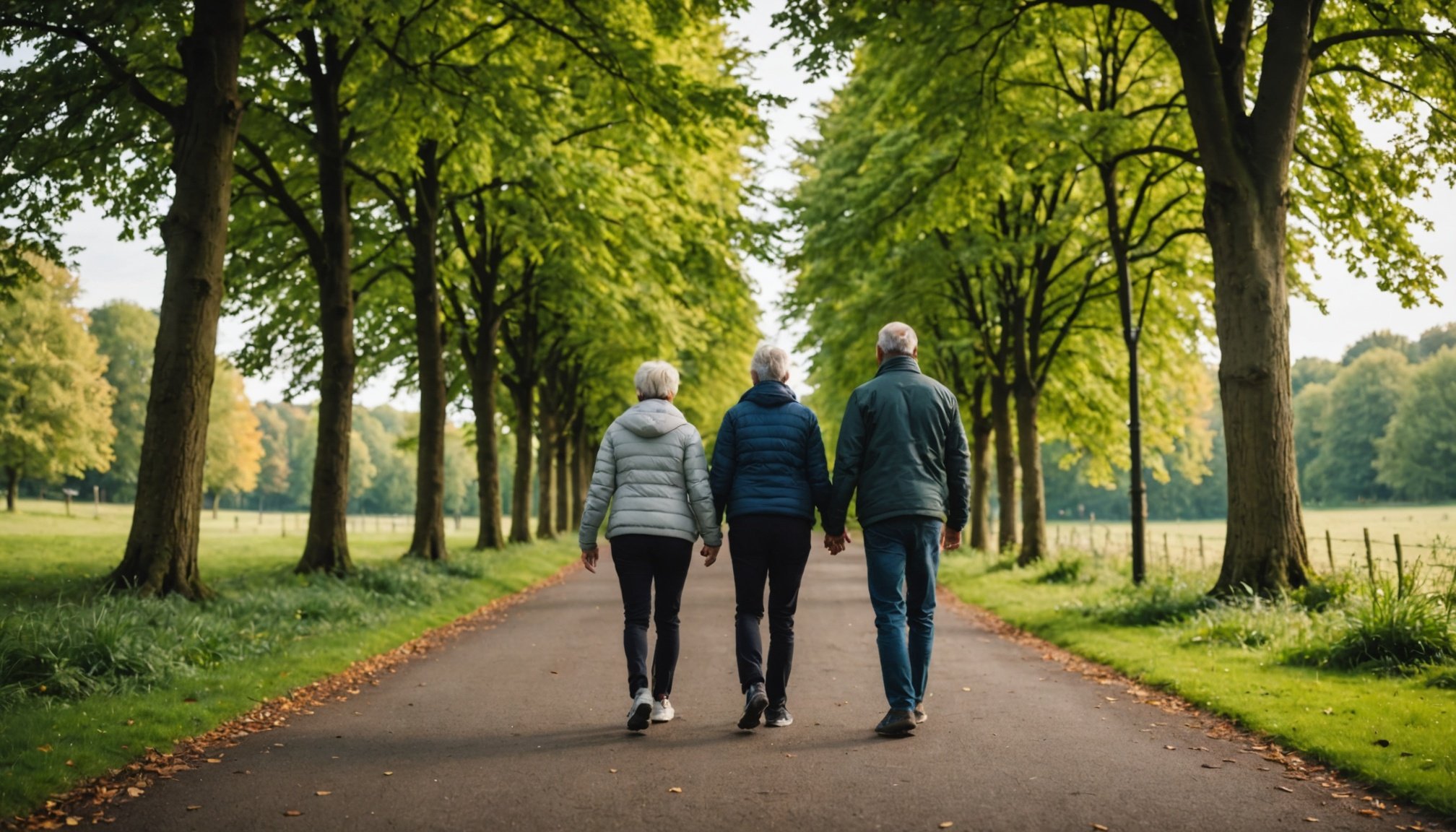Benefits of Outdoor Walking for Mental Health
Engaging in outdoor walking offers a variety of benefits for mental health, providing a natural escape from everyday stresses. Research reveals that immersing oneself in nature not only fosters a serene environment but also significantly contributes to mental well-being. This form of exercise is lauded for its potential in anxiety relief and elevating mood levels.
When you take a stroll amidst trees or along a scenic path, you’re embracing an opportunity to disconnect and recalibrate. Such environments encourage the release of endorphins – your body’s natural mood lifters. Studies consistently show a correlation between outdoor activities and decreased anxiety levels. Engaging in these activities can serve as a potent, non-invasive tool for those battling anxiety.
In the same genre : Top Strategies for Effectively Managing Lactose Intolerance in the UK
Furthermore, exposure to sunlight plays a critical role in enhancing mood. It triggers the production of serotonin, a hormone linked to feelings of happiness and calmness. This interchange with nature offers a tangible uplift in emotional state.
In essence, integrating outdoor walks into your routine can act as a natural antidote to modern life’s pressures. The benefits are manifold: from reducing anxiety to boosting serotonin levels, it’s a holistic approach to nurturing mental health.
Also to discover : Discover the Remarkable Health Benefits of Regular Swimming for Seniors in the UK
Psychological Effects of Nature on Anxiety
The relationship between nature exposure and anxiety reduction is profound. Immersing oneself in nature can significantly enhance psychological well-being. Numerous studies underscore how spending time in green spaces alleviates anxiety symptoms.
Connection between nature and mental wellness
Engagement with nature promotes mental wellness. This connection is predominantly due to the serene and restorative experiences nature offers. Nature exposure has been shown to lower cortisol levels, which contributes to overall stress and anxiety reduction.
Studies highlighting nature’s calming effects
Research consistently supports nature’s calming effects. For instance, a study published in the “Journal of Environmental Psychology” revealed that participants who took regular walks in forested areas reported marked improvements in anxiety levels. Similarly, natural sounds and sights are known to enhance relaxation, promoting a soothing atmosphere conducive to mental well-being.
The role of green spaces in urban environments
Green spaces are vital in urban settings, providing residents with accessible areas for relaxation and reflection. Parks and gardens offer an urban sanctuary, encouraging residents to immerse themselves in nature. This not only fosters anxiety reduction but also improves overall mental wellness. Urban planners are strategically incorporating green spaces to bolster community health and well-being. By making nature a staple in urban environments, we cultivate healthier, more resilient communities.
Practical Tips for Incorporating Outdoor Walks
Adding outdoor walks into your daily routine can be a transformative mental health strategy. Integrate this habit effortlessly by identifying specific times in your schedule. Perhaps early mornings or lunch breaks are opportune moments. Consistency is key, so aim to walk at the same time each day.
To build a walking routine amidst a busy schedule, start with small commitments. A ten-minute walk is better than none and can be progressively extended. Using reminders or scheduling walks as formal calendar events helps ensure they aren’t overlooked.
Choosing the right locations is crucial for getting the most out of your outdoor walk. Local parks, trails, or scenic neighbourhoods provide a change of scenery and enhance enjoyment. Avoid crowded urban areas if tranquillity is the goal. Exploring multiple locations can also keep the activity interesting and prevent monotony.
Remember, walking doesn’t have to be solitary. Invite friends or family to join, doubling the benefits by strengthening social connections. As you start incorporating outdoor walks into your daily routine, you’ll notice improvements in your mental health and overall wellbeing.
Community Resources and Local Parks
Exploring local parks and harnessing community resources can significantly enhance both physical and mental well-being. Outdoor activities provide opportunities to unwind, explore, and connect with nature and others.
Finding Nearby Parks and Nature Spots
Locating nearby parks is simple with modern tools. Many municipalities offer website directories with maps of parks and their facilities. Mobile apps like AllTrails or Park Finder can also help identify walking trails and nature spots fitting one’s interests and fitness levels. Remember to check park hours and any special guidelines before visiting.
Community Programs Promoting Outdoor Activity
Municipalities and non-profit organizations frequently run programs encouraging outdoor activity. These initiatives often include organized hikes, educational walks, and family-friendly events. By participating, community members benefit from guided experiences, enhancing their knowledge and appreciation of local ecosystems. Many programs emphasise mental well-being alongside physical activity, providing a holistic approach to health.
Local Walking Groups and Support Networks
Local walking groups offer not just an opportunity for physical exercise but also a support network. Connecting with a group can be as easy as checking community bulletin boards, social media, or sites like Meetup. These groups foster social interaction and encouragement, often leading to lasting friendships. They cater to all fitness levels and can be an excellent way to maintain motivation while exploring new areas safely.
Personal Anecdotes and Testimonials
Engaging with real-life experiences showcases the transformative impact of outdoor walking on mental health improvement. Personal stories from individuals across various demographics in the UK reveal authentic benefits and inspire others to embark on similar journeys.
One notable account highlights Jane, a busy mother from London who integrated daily walks into her routine. Initially skeptical, Jane started walking in her local park, quickly noting reduced anxiety levels and improved mental clarity. She found that the natural surroundings provided a refreshing change from her usual environment, promoting a sense of calm and wellness. Jane’s experience underscores how simple practices can yield significant mental health improvements.
Similarly, Tom, a retiree from Edinburgh, shared his story of battling loneliness. By joining a walking group, he not only improved his physical health but also made new friendships, drastically enhancing his social life and reducing feelings of isolation. These personal stories confirm the broad spectrum of benefits outdoor walking offers.
Such testimonials motivate others, illustrating that real transformations are achievable irrespective of age or lifestyle. By incorporating regular walks, numerous individuals have reported significant mental and emotional benefits, inspiring those seeking anxiety relief to explore this effective practice.
Expertise and Professional Opinions
In understanding the impact of outdoor walks on mental health, expert insights are invaluable. Mental health professionals have long emphasised the positive psychological effects of connecting with nature. Research findings indicate that regular exposure to outdoor environments can substantially improve mood and reduce stress.
Interviews with Mental Health Experts
Interviews conducted with mental health specialists reveal a consensus: spending time outdoors is beneficial. Many therapists advocate for integrating nature into treatment plans, underscoring its ability to enhance therapy outcomes. According to mental health professionals, even short walks in natural settings can lead to noticeable improvements in mental clarity and emotional well-being.
Summary of Expert Recommendations
Experts suggest making outdoor activities a regular part of mental health strategies. Recommendations include starting with brief, daily walks and gradually increasing duration to reap full benefits. These activities are most effective when tailored to individual preferences, ensuring that they are both enjoyable and accessible.
Link Between Professional Advice and Personal Experiences
Linking professional advice with personal experiences creates a comprehensive understanding of mental health interventions. Anecdotal evidence often echoes expert recommendations, as many individuals report feeling rejuvenated after spending time in nature. This synergy suggests a powerful connection between expert insights and personal stories, reinforcing the effectiveness of outdoor activities in enhancing mental health.











